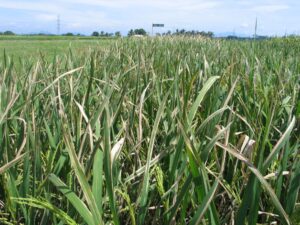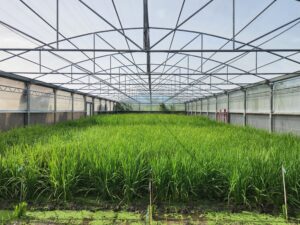The IRRI Training Center and Postharvest Unit conducted a three-day training course on Farm Machinery Safety and Operation for the mechanics, operators, and field supervisors of IRRI’s Experiment Station (ES) on 14-16 October 2015. The training served to update the skills and knowledge of ES staff in the safe operation and maintenance of the machines being used in IRRI’s experimental fields and facilities. Joseph Rickman, mechanization and production systems specialist; Martin Gummert, head of the Postharvest Unit; and Carlito Balingbing, senior associate scientist, facilitated the training.
“This program will instill good practice in maintenance and confidence in the operation of farm machinery at ES,” Rickman said.
Nine ES staff, including the farm manager, field operations manager, supervisors, and technicians (operators and mechanics), attended the training course. On the first day, the trainees were asked to survey the different hazards and dangers across the ES that might impede safe and smooth machinery operations. Rickman emphasized the importance of having a safe environment and properly maintained equipment to reduce risk and improve efficiency. He also highlighted the importance of maintaining an accurate and comprehensive inventory of the status of all the equipment and machines, and keeping record of hazards, accidents, near misses, and machinery defects. Having regularly maintained equipment and well-oriented operators helps ensure that the mechanized field activities of the ES are efficient, effective, and safe.
James Quilty, head of ES, is very supportive of this initiative and intends to include this training and certification program as an annual activity, with the aim of continuing to improve safety and efficiency standards. To successfully run this program, agricultural engineers from the Postharvest Unit will serve as evaluators in the accreditation of the technical and operation skills of ES equipment operators and mechanics. Martin Gummert also expressed his interest in this type of arrangement with the ES in order to keep staff members updated and well-versed on the mechanization program of IRRI.
“This is the first step in developing training courses and in-house certification for operators of agricultural machinery at IRRI. We are planning to expand this basic course on safety, operation, and maintenance of tractors and combine harvesters, and develop additional training modules on tractor implements and field operation. These courses can then also be adapted for our country programs to supplement training already provided by our NARES partners,” Gummert concluded.
Learn more about IRRI (www.irri.org) or follow us on the social media and networks (all links down the right column).












